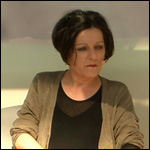
Herta Müller is a highly prolific novelist and essayist whose works portray the human destruction of the Romanian dictatorship and the rootlessness of the political exile.
She was born in August 1953 in the German-speaking village of Nitzkydorf, in the Banat district of Romania. She left her village to study German and Romanian literature at the University of Timisoara. Here she became part of the Aktionsgruppe Banat, a group of idealistic Romanian-German writers seeking freedom of expression under the Ceaucescu dictatorship. After completing her studies she was employed as a translator in a machine factory, until she was fired for refusing to cooperate with the secret police. During this time she wrote the short stories that make up the collection Niederungen, but she had difficulty satisfying the censors, and this work was not published until 1982, and then in radically modified form. Niederungen was followed two years later by Drückender Tango.
In these two works Müller depicted the hypocrisy of village life and its ruthless oppression of nonconformists. She portrayed the zealously fascist mentality of the German minority, its intolerance and corruption. Not surprisingly, she was sharply criticized at home for destroying the idyllic image of German rural life in Romania.
Müller was working as a teacher when her uncensored manuscript of Niederungen was smuggled to the west and published by the Rotbuch Verlag to instant critical acclaim. After a trip to the Frankfurt book fair, where she spoke out publicly against the Romanian dictatorship, she was forbidden to publish in Romania. She continued to write, however, even as her situation in Romania became more and more intolerable. In 1987 she emigrated to the West with her husband, Richard Wagner. Since then, she has been living in Berlin.
Many of Müller's works reflect aspects of her own history. Der Mensch ist ein großer Fasan auf der Welt (1986) chronicles the efforts of a Romanian-German peasant family to get passports to leave the country. Like her earlier works, this tale exposes the brutal corruption of the village by showing how its officials, from postmaster to priest, demanded ever more material and sexual favors from those petitioning to leave the country. It, like the collection Barfüßiger Februar (1987), was written while Müller was waiting for permission to emigrate to the west.
Reisende auf einem Bein (1989) portrays the problems of resettlement in the west, and the feelings of alienation that plague the political exile. Many of the essays in Eine warme Kartoffel ist ein warmes Bett (1992) are reflections on political events, written from the perspective of a woman reluctant to lay claim to words such as "homeland." A second volume of essays, Der Teufel sitzt im Spiegel (1991) includes a series of lectures on "Gedanken zum Schreiben" that Müller held at the University of Paderborn in 1989-1990. It is an indispensable key to understanding the tensions and conflicts that give rise to the poetic imagery in her work. The volume includes a number of collages combining image and text. Müller published a complete set of 94 collages under the title Der Wächter nimmt seinen Kamm. Vom Weggehen und Ausscheren in 1993; although poetic images are densely concentrated here onto single, unbound pages, they form an evolving network of motifs that give unity to the whole.
The novel Der Fuchs war damals schon der Jäger (1992) is a complete reworking of a filmscript entitled "Der Fuchs der Jäger," that she co-wrote with Harry Merkle. The main character is a teacher harassed by the Romanian secret police. Through synecdoche Müller portrays the fragmentation of self that occurs in a nation governed by fear. Müller's latest novel Herztier (1994) is her richest portrayal to date of life in the Romanian dictatorship, in that she links the repressive childhood of her narrator with the brutal oppression of the state. Her most recent work, Hunger und Seide (1995), is a collection of essays, many of them reflections on her situation as nonconformist and dissident in Nitzkydorf and Timisoara.
Müller's works are characterized by pure, poetic language and metonymic metaphors that recur and evolve throughout her tales. The oppressiveness of theme is alleviated by the beauty of her prose and the flashes of humor behind some of her imagery.
Through words and actions Müller continues to demonstrate her independence from the dogma of church and state. She has been an outspoken critic of those East German writers who collaborated with the secret police, and has recently withdrawn from P.E.N. as a protest against its decision to merge with its former DDR branch. She has won a dozen literary prizes, including the Marieluise-Fleißer Prize (1990), the Kranichsteiner Literary Prize (1991), the Kleist Prize (1994), and the European Literary Prize "Aristeion" (1995).
www.dickinson.edu
Read More: